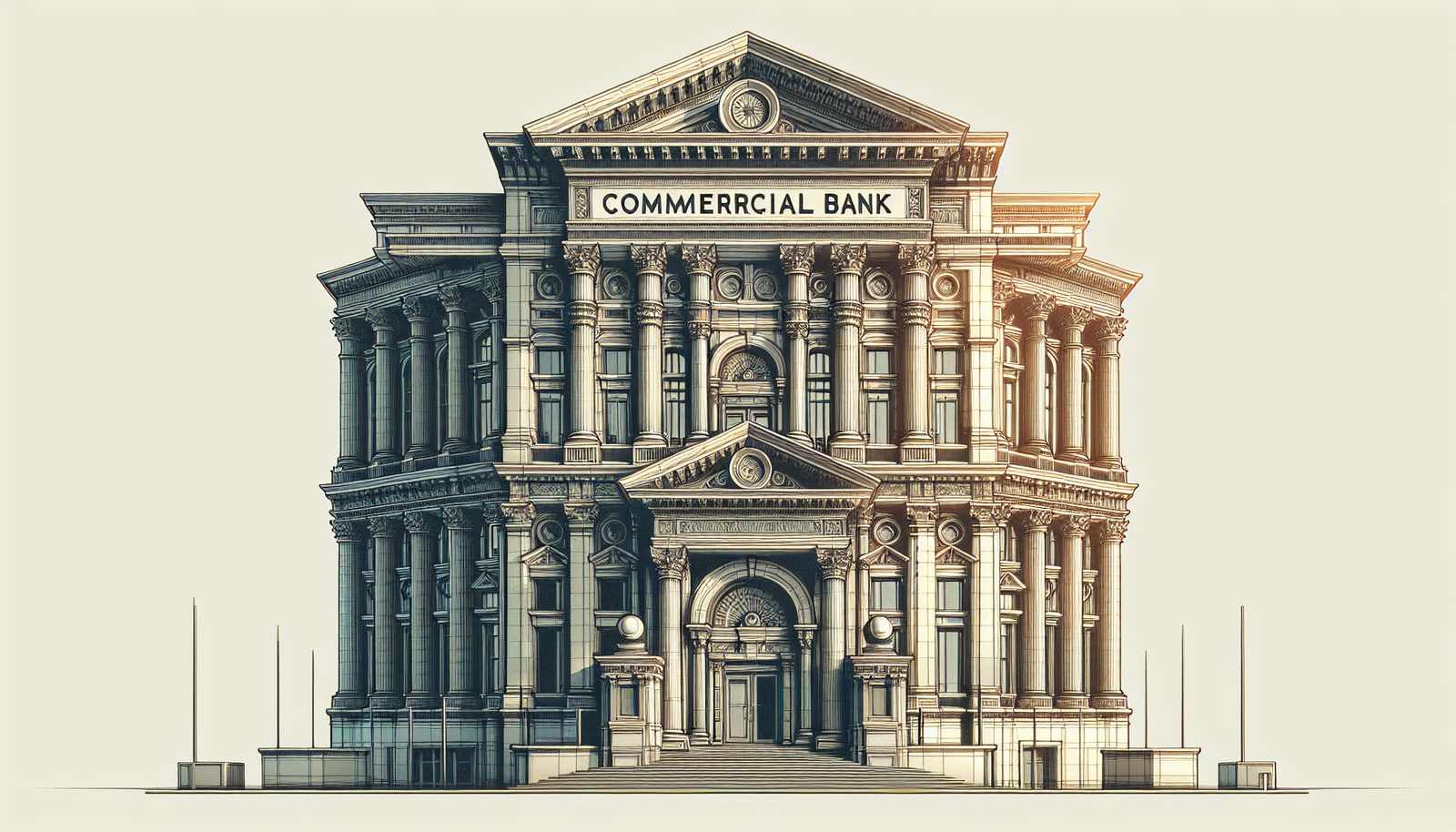
Step into the vibrant world of finance as we hold a magnifying glass over the backbone of the world’s economic structures – the commercial bank. Immerse yourself in an exploration of its roles, the crucial services it provides and how it perfectly interlinks every strand of the vast financial tapestry. This intricate network is not just a place for transactions but an indispensible entity, a dynamic force which fuels the engine of our economy. “Importance of Commercial Bank” intricately stitches together the indispensable duties these institutions fulfill and silent yet vigorous impact they have on your finances and the economy as a whole.

Understanding Commercial Banks
Embrace a world where money changes hands effortlessly, countless businesses propel forward, and economies burgeon into prosperity. This is the world of commercial banks – much more than just skyscraper buildings or online apps where money is held. Let’s embark on a journey to comprehend the intricacies of commercial banks.
Definition of Commercial Banks
Commercial banks are financial institutions that you, both individuals and businesses, run to for financial succor. They’re your safe haven, housing your hard-earned money, and more. They grant loans for your entrepreneurial dreams or personal needs, bolster businesses through financial services, and play an integral role in maintaining the financial ecosystem of the economy.
History and Evolution of Commercial Banks
Would you believe if we told you that the roots of modern commercial banking traces back to ancient merchants offering loans of grain money to farmers and traders? Yet, as the centuries rolled by and humans advanced, so did the banking system. The 14th-century Italian ‘Banco’ evolved into the 18th-century English and Scottish financial innovation. This then matured over the 19th and 20th centuries into the globe-spanning giants that you recognize today.
Components and Structure of Commercial Banks
When you peer into the inner workings of your everyday bank, you’ll note various components and organizational structures in place. The Board of Directors takes the helm, steering the bank’s overall direction. This trickles down to strategic divisions—like corporate, retail, or investment banking—and further to operational departments—like treasury, risk management, sales and marketing. Each cog in this banking wheel has a distinct yet interconnected role in the grand scheme of commercial banking.
Roles of Commercial Banks in the Economy
Now comes the breathtaking panorama—commercial banks’ contributions towards the economy are staggering.
Stimulation of Economic Growth
Commercial banks are a powerhouse of economic growth. They inject life into economies by creating credit for businesses and individuals, fuelling investment, consumption, and thus, economic growth.
Creating Security for Deposits
In a world without banks, where would your earnings go? Commercial banks provide a secure shelter for your wealth, thereby instilling confidence and promoting financial health.
Facilitating Money Transfer
Remember the last time you wired money or paid bills online? Commercial banks are at the heart of these transfers, ensuring fluidity in transactions both at domestic and international levels.
Commercial Banks and Business Financing
Businesses and commercial banks share a symbiotic relationship. The banks need businesses for profitability, and businesses need banks for growth.
Providing Business Loans
Got a revolutionary idea or a business expansion in mind? Commercial banks are often your first line of financial traction. They provide short-term, medium-term, or long-term loans, pumping life into your business aspirations.
Offering Bank Guarantees
Commercial banks also mediate trust between businesses through bank guarantees. Whether it’s guaranteeing payment to a supplier or securing a hefty project deal—banks provide the cushion of assurance in business transactions.
Overdraft Facilities for Businesses
Imagine your business suddenly facing a cash crunch. Thanks to your commercial bank, you can still withdraw money through overdraft facilities. Although it’s a loan and intended to be short-term, it’s indeed a lifeline for businesses.

Personal Banking Services
Commercial banks are your personal finance partners. They offer numerous services tailoring to your diverse needs.
Personal Loans and Mortgages
Whether you’re dreaming of a destination wedding, a luxury vehicle, or a beautiful home, commercial banks have got you covered. Personal loans and mortgages create financial possibilities beyond your immediate reach.
Savings and Checking Accounts
From your first salary or pocket money to your retirement savings, banks safeguard your money. They provide savings and checking accounts, encouraging financial discipline while ensuring accessibility for everyday transactions.
Debit and Credit Card Services
Thanks to commercial banks, you can shop, dine, or travel with a mere plastic card—debit or credit, offering you cashless convenience and financial flexibility.
Commercial Banks as Financial Intermediaries
Banks act as middlemen between savers and borrowers, an essential, yet often overlooked role they play in the economy.
The Process of Financial Intermediation
Your deposited money doesn’t simply sit idle in the bank. Instead, banks loan it to individuals, businesses, or the government. This act of channeling funds from savers to borrowers is termed financial intermediation—a vital economic process commercial banks partake.
Benefits of Financial Intermediation
Financial intermediation leads to efficient allocation of capital, promotes savings and investment, manages risk, and ultimately contributes to economic growth.
Potential Risks of Financial Intermediation
Risks do lurk within the realm of financial intermediation. From default risks to market risks, commercial banks operate in the delicate balance between profitability and safety.
Investment Services of Commercial Banks
Aspiring to grow your wealth? Commercial banks extend beyond traditional banking to investment services.
Mutual Funds and Bonds
Commercial banks might kindle your financial prosperity through mutual funds and bonds—an enticing avenue for individuals and institutions to grow their money.
Stock Market Investments
Not just deposits and loans, banks guide you in your stock market adventures, providing brokerage services to buy, sell, or hold stocks.
Retirement and Pension Funds
You’re never too early to plan for retirement. Commercial banks offer pension funds to secure your golden years, enabling you to retire with financial grace.
The Regulatory Environment of Commercial Banks
Commercial banks operate within a well-regulated framework, meticulously crafted to maintain stability and trust in the system.
Importance of Regulation in Banking
Regulations are there for a reason—they guard against financial mishaps, protect consumer interests, and maintain the healthy functioning of the banking system.
Major Regulations in the Banking Industry
Remember the ominous 2008 financial crisis? In its aftermath sprung many regulations like the Dodd-Frank Act, Basel III norms, and more—directing banks toward safer and more transparent practices.
Impact of Regulations on Commercial Banks
Regulations come with an impact—some may dent profitability, while others might drive banks to adapt, innovate, and be more resilient institutions.
Technology and Commercial Banking
Technological innovation and commercial banking are inseparable. The rapid digitalization has reshaped how commercial banks operate, how you bank.
Impacts of Technological Advances on Commercial Banking
Never visited a bank, yet got your needs serviced? Technology—from online transfers to chatbots— has redefined customer experience, making banking a seamless process.
Online Banking and Mobile Apps
Commercial banks at your fingertips—thanks to online banking and mobile apps. You can check account balances, transfer funds, pay bills, or even apply for a loan, all from your cozy couch.
Security and Technology in Commercial Banking
While technology brings immense convenience, it also invites risks—cybercrimes, data breaches, identity thefts. Thus, commercial banks heavily invest in security technologies, keeping your hard-earned money safe in this digital era.
Challenges Facing Commercial Banks
Despite its invaluable contributions, commercial banking is not without its challenges.
Economic Fluctuations and Banking
Banks are at the mercy of economic cycles. During downturns, they face increased defaults, falling profitability.
Increased Competition in Banking Services
The banking industry is no longer a traditional banking arena. Today, it’s a battleground with fintech firms, digital wallets, peer-to-peer lenders—all vying for a piece of the financial pie.
Impacts of Bad Debts and Loan Defaults
Your unpaid loans pose a serious hazard to commercial banks—eroding their profits, even leading to insolvency in extreme cases.
The Future of Commercial Banks
Commercial banks, despite challenges, are here to stay. Yet their future will be different—more tech-driven, customer-centered, and globally intertwined.
Emerging Trends in Commercial Banking
From AI-led banking to blockchain technology, several trends are shaping the commercial banks of tomorrow.
Predicting the Future of Commercial Banking
Predicting the future is always a tricky affair. Yet, the prominence of digital technology, personalized customer experience, and sustainable finance are a few certainties.
Impact of Globalisation on Commercial Banks
Commercial banks operate in an increasingly global context. This globalisation exposes them to new markets, diversifying offerings, but also to widespread risks.
The voyage through the world of commercial banks encores the significance of these financial stalwarts. They’re not just corner buildings or phone apps, but living, bustling entities propelling people, sowing businesses, and growing economies. As you go with your day, remember—you are partaking in the grand saga of commercial banking.

Leave a Reply